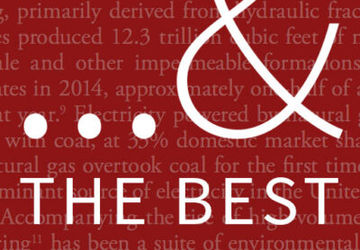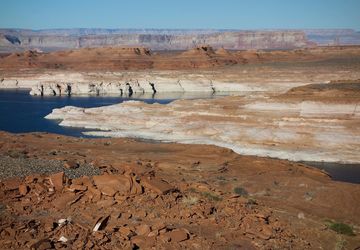The beach at Teller, Alaska. Photo by the Bering Land Bridge National Preserve via Flickr.
In addition to supporting students and scholars in their explorations of the American West, the Bill Lane Center is proud to sponsor journalists reporting on vital issues in the region. And while the journalistic enterprise is often seen as distinctly separate from academic scholarship, it is our belief that collaborations between reporters and academics have the potential to go deeper than work produced by either group alone, increasing awareness among broad audiences about the most crucial matters facing the West. This is why, for more than a decade, our Western Journalism and Media Fellowship program has brought journalists and Stanford experts together, enabling coverage of the American West that is thoroughly researched, expertly written and imaginatively conveyed.
The recipient of our 2020 fellowship is Yereth Rosen, who has been reporting on climate change in Alaska for twenty years. She has decades of experience covering environmental, energy and marine issues, and in recent years, she’s frequently reported on the Bering Sea region, “the Pacific gateway to the Arctic Ocean.” Though we usually bring journalism fellows to campus to interact with researchers, scholars and students, COVID-imposed regulations prevented travel to Stanford this past year. But that didn’t stop Rosen from pursuing stories in Alaska that intersect with the Bill Lane Center’s ongoing consideration of climate change, and the impacts of changing ecosystems on land, water, wildlife and people in the West.
In a series of stories published in Arctic Today, Rosen used the media fellowship to examine multiple issues facing the Bering Sea, which she describes as both “a frontier and a region of antiquity.” The region is also at a climate tipping-point, Rosen says, sharing more details in her fellowship application: “Its once-dependable winter ice is now sporadic. Its waters have warmed in the longest and largest marine heat wave on record. Seabirds and marine mammals have perished in mass die-offs. Algal toxins are moving north, as are boreal fish species that are displacing slower-growing, higher-fat Arctic species. Newly unfrozen waters are unleashing winter storm surges and floods and accelerating coastal erosion. Zoonotic diseases more common in agricultural centers of the south are moving north, infecting marine mammals, birds and threatening people. Some of the world’s most acidic ocean waters are in the Bering Sea.”
To explore these dramatic changes in depth, Rosen first looked into the impact of coronavirus on visiting researchers, who couldn’t perform fieldwork in the region due to travel restrictions. As a result, some Bering Sea residents have assumed the role of citizen scientists, taking on research duties they wouldn’t normally have. Her next story offers a somber look at what the loss of Bering Sea ice means for the people and wildlife who depend on it. In early February of 2021, Rosen published a piece on the Bering Sea gold-mining boom, “driven in part by reality TV and influenced by climate change,” she said. Southern Bering Sea ecosystem upheaval, the result of difficulty adapting to climate change in the Aleutian Islands, is the subject of her fourth story. A fifth piece taking up teleconnections in the region is forthcoming, as is a final article on the revived Northern Bering Sea Climate Resilience Area. Though she didn't intend to write about this program for the Bill Lane-sponsored series, new events made it relevant again, and it became an apt epilogue for the Bering Sea articles. “This is a program that was put into place by executive order (Obama in 2016), abolished by executive order (Trump in 2017), and now restored by executive order (Biden in 2021),” said Rosen. She hopes it gives greater voice to indigenous people: “This program is intended to give indigenous people more autonomy and power over management decisions and more input into research.”
"When Yereth first approached me, shortly after I took over this portfolio at the Bill Lane Center, her opening question was: 'Do you consider Alaska part of the American West?'" said Felicity Barringer, the Center's writer in residence. "I said we did. But I was struck by the uncertainty underlying the question: the worry that because one state is not contiguous to others, it somehow didn't count. In every way, from its size to the remoteness of its population to the widespread presence of Native groups, Alaska is a quintessential example of what makes the West "the West." The comprehensiveness of Yereth's work in this series, along with the deftness of her language and the importance of the ideas she explores, makes it a source of great pride. It's a significant contribution to our understanding of climate change and its impact on the West."
Though COVID forced a restructuring of Rosen’s project, she is extremely grateful for the Lane Center’s financial assistance, which allowed her to visit and report from Nome and Fairbanks. St. Paul Island still beckons, as does Unalaska (a big U.S. seafood port) and Teller (a small village connected to Nome by a dirt road). Tight COVID restrictions are in place there to keep outsiders away; with its lack of medical services, rural Alaska would be devastated by a mass outbreak.
Rosen also expressed gratitude to the Lane Center for allowing her to tell more of the Bering Sea’s story, bringing increased visibility to a region that is often overlooked as part of the American West. “There's a saying about [the Bering Sea], that it's ‘the edge of tomorrow,’" she said. “And it's transforming fast. I've been arguing (maybe agitating) since about 2016 or maybe earlier for some kind of in-depth Bering Sea coverage. It's an area that's extremely important to the whole marine environment and to modern commerce. For example, pretty much every fast-food fish burger eaten in the United States comes from the Bering Sea; the Bering Sea fisheries are some of the biggest in the world. The Bering has played a big role in history and events going back millennia. In 2018 there was a dramatic loss of ice – in the middle of winter – and the rest of the world started paying more attention.”



